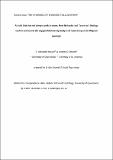Files in this item
A truth that does not always speak its name : how Hollander and Turowetz’s findings confirm and extend the engaged followership analysis of harm-doing in the Milgram paradigm
Item metadata
| dc.contributor.author | Haslam, S. Alexander | |
| dc.contributor.author | Reicher, Stephen David | |
| dc.date.accessioned | 2019-02-21T00:33:42Z | |
| dc.date.available | 2019-02-21T00:33:42Z | |
| dc.date.issued | 2018-02-21 | |
| dc.identifier | 252202642 | |
| dc.identifier | 4020c602-24ff-4d06-9016-be890c427b05 | |
| dc.identifier | 85042280911 | |
| dc.identifier | 000428874900002 | |
| dc.identifier.citation | Haslam , S A & Reicher , S D 2018 , ' A truth that does not always speak its name : how Hollander and Turowetz’s findings confirm and extend the engaged followership analysis of harm-doing in the Milgram paradigm ' , British Journal of Social Psychology , vol. 57 , no. 2 , pp. 292-300 . https://doi.org/10.1111/bjso.12247 | en |
| dc.identifier.issn | 0144-6665 | |
| dc.identifier.uri | https://hdl.handle.net/10023/17107 | |
| dc.description.abstract | Hollander and Turowetz (2017) present important data from post-experimental interviews with participants in Milgram’s ‘obedience’ research. In these, participants responded to various questions about their perceptions of the study and their behaviour by indicating that they trusted the Experimenter not to let them inflict serious harm. Relatively few participants indicated that they acted as they did because they were committed to the Experimenter or to science. We argue, however, that there are two key reasons why this evidence is not inconsistent with claims that harm-doing is a product of engaged followership. The first is that (in contrast to the data obtained from later post-experimental surveys) the conversational logic of the interviews does not topicalise a discussion or valorisation of science, but instead requires participants to defend themselves against an accusation of improper behaviour. The second is that participants’ accounts of their behaviour nevertheless revolved around expressions of trust in the Experimenter which can themselves be see as manifestations of shared identity and engaged followership. Nevertheless, we argue that H&T’s analysis points to significant ways in which the engaged followership account and its broader implications for understanding perpetrator behaviour can be embellished. | |
| dc.format.extent | 589269 | |
| dc.language.iso | eng | |
| dc.relation.ispartof | British Journal of Social Psychology | en |
| dc.subject | Milgram | en |
| dc.subject | Obedience | en |
| dc.subject | Conformity | en |
| dc.subject | Authority | en |
| dc.subject | Social identification | en |
| dc.subject | Followership | en |
| dc.subject | BF Psychology | en |
| dc.subject | T-NDAS | en |
| dc.subject.lcc | BF | en |
| dc.title | A truth that does not always speak its name : how Hollander and Turowetz’s findings confirm and extend the engaged followership analysis of harm-doing in the Milgram paradigm | en |
| dc.type | Journal article | en |
| dc.contributor.institution | University of St Andrews. School of Psychology and Neuroscience | en |
| dc.contributor.institution | University of St Andrews. St Andrews Sustainability Institute | en |
| dc.identifier.doi | https://doi.org/10.1111/bjso.12247 | |
| dc.description.status | Peer reviewed | en |
| dc.date.embargoedUntil | 2019-02-21 |
This item appears in the following Collection(s)
Items in the St Andrews Research Repository are protected by copyright, with all rights reserved, unless otherwise indicated.

